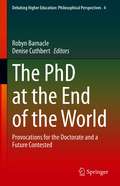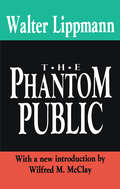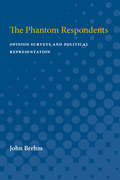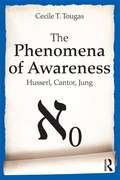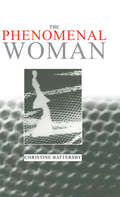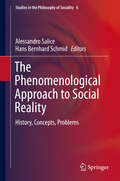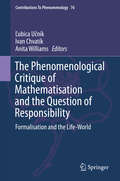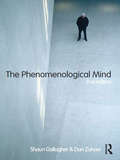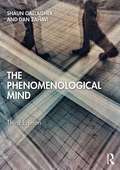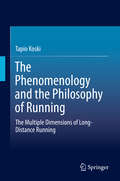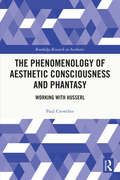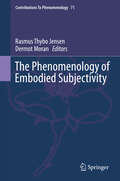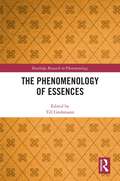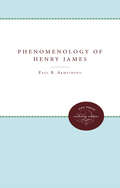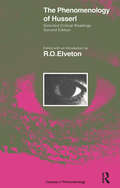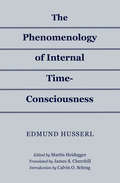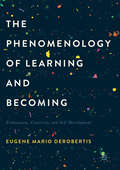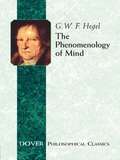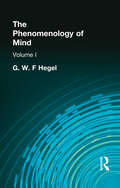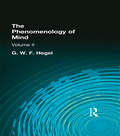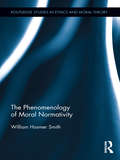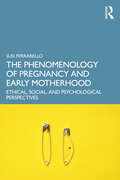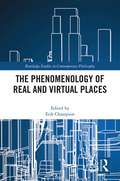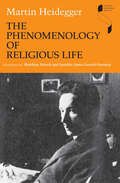- Table View
- List View
The PhD at the End of the World: Provocations for the Doctorate and a Future Contested (Debating Higher Education: Philosophical Perspectives #4)
by Denise Cuthbert Robyn BarnacleThis book addresses a world-wide audience with reference to a global problem: how the PhD can serve the planet. It examines the role of the PhD, in and of itself, and, as representative of research, the university and evidence-based knowledge, in relation to global crisis and the future of humanity. As such, it speaks to the scholar, the teacher, the policy-maker and the administrator concerned with the role of higher education’s highest award at a time of great global crisis. The approach is critical in that it offers diverse views on these issues and does not seek to privilege one single school of thought. The collected articles span theoretical reflections on key issues through to case-study examples of how PhDs are being deployed and re-thought to address global issues.
The Phantom Public
by Walter LippmannIn an era disgusted with politicians and the various instruments of "direct democracy," Walter Lippmann's The Phantom Public remains as relevant as ever. It reveals Lippmann at a time when he was most critical of the ills of American democracy. Antipopulist in sentiment, this volume defends elitism as a serious and distinctive intellectual option, one with considerable precursors in the American past. Lippmann's demythologized view of the American system of government resonates today.The Phantom Public discusses the "disenchanted man" who has become disillusioned not only with democracy, but also with reform. According to Lippmann, the average voter is incapable of governance; what is called the public is merely a "phantom." In terms of policy-making, the distinction should not be experts versus amateurs, but insiders versus outsiders. Lippmann challenges the core assumption of Progressive politics as well as any theory that pretends to leave political decision making in the hands of the people as a whole.In his biography Walter Lippmann and the American Century, Ronald Steel praised The Phantom Public as "one of Lippmann's most powerfully argued and revealing books. In it he came fully to terms with the inadequacy of traditional democratic theory." This volume is part of a continuing series on the major works of Walter Lippmann. As more and more Americans are inclined to become apathetic to the political system, this classic will be essential reading for students, teachers, and researchers of political science and history.
The Phantom Respondents
by John BrehmExamines a fundamental problem for opinion polls and those who use them.
The Phenomena of Awareness: Husserl, Cantor, Jung
by Cecile TougasWhat is awareness? How is dreaming different from ordinary awareness? What does mathematics have to do with awareness? Are different kinds of awareness related? “Awareness” is commonly spoken of as “mind, soul, spirit, consciousness, the unconscious, psyche, imagination, self, and other.” The Phenomena of Awareness is a study of awareness as it is directly experienced. From the start, Cecile T. Tougas engages the reader in reflective notice of awareness as it appears from moment to moment in a variety of ways. The book draws us in and asks us to focus on the flow of phenomena in living experience, not as a theoretical construct, nor an image, nor a biochemical product, but instead as phases, moments, or parts that cannot exist without one another. Tougas shows how these parts exist in mutual dependence as a continuum of awareness, as the flow of lived time, and how noticing time deepens psychological self-understanding and understanding of another. The Phenomena of Awareness is divided into four parts: • Seeking and Noticing Awareness• Observing and Understanding the Flow of Phenomena• Distinguishing Intentional Acts• Work in Progress Drawing on the work of E. Husserl, G. Cantor and C.G. Jung, this book is an original synthesis of phenomenology, mathematics and psychology that explores awareness and the concept of ‘transfinite number’. This book will be of interest to analytical psychologists, philosophers, mathematicians, feminist scholars, humanities teachers and students. Cecile T. Tougas teaches Latin at the North Carolina School of Science and Mathematics, Durham. She taught philosophy at the University of Southern Maine and the University of Massachusetts Lowell.
The Phenomenal Woman: Feminist Metaphysics and the Patterns of Identity
by Christine BattersbyThis original book enters the undeveloped territory of feminist metaphysics and offers a bold and unusual contribution to debates about identity, essence and self. Using a diverse range of theories - from Kant to chaos theory, from Kierkegaard to Deleuze, Irigaray, Butler and Oliver Sachs - this book challenges the assumption that metaphysics can remain unchanged by issues of sexual difference.
The Phenomenological Approach to Social Reality
by Hans Bernhard Schmid Alessandro SaliceThis volume features fourteen essays that examine the works of key figures within the phenomenological movement in a clear and accessible way. It presents the fertile, groundbreaking, and unique aspects of phenomenological theorizing against the background of contemporary debate about social ontology and collective intentionality. The expert contributors explore the insights of such thinkers as Martin Heidegger, Edmund Husserl, Adolf Reinach, and Max Scheler. Readers will also learn about other sources that, although almost wholly neglected by historians of philosophy, testify to the vitality of the phenomenological tradition. In addition, the contributions highlight the systematic relevance of phenomenological research by pinpointing its position on social ontology and collective intentionality within the history of philosophy. By presenting phenomenological contributions in a scholarly yet accessible way, this volume introduces an interesting and important perspective into contemporary debate insofar as it bridges the gap between the analytical and the continental traditions in social philosophy. The volume provides readers with a deep understanding into such questions as: What does it mean to share experiences with others? What does it mean to share emotions with friends or to share intentions with partners in a joint endeavor? What are groups? What are institutional facts like money, universities, and cocktail parties? What are values and what role do values play in social reality?
The Phenomenological Approach to Social Reality: History, Concepts, Problems (Studies in the Philosophy of Sociality #6)
by Hans Bernhard Schmid Alessandro SaliceThis volume features fourteen essays that examine the works of key figures within the phenomenological movement in a clear and accessible way. It presents the fertile, groundbreaking, and unique aspects of phenomenological theorizing against the background of contemporary debate about social ontology and collective intentionality.The expert contributors explore the insights of such thinkers as Martin Heidegger, Edmund Husserl, Adolf Reinach, and Max Scheler. Readers will also learn about other sources that, although almost wholly neglected by historians of philosophy, testify to the vitality of the phenomenological tradition. In addition, the contributions highlight the systematic relevance of phenomenological research by pinpointing its position on social ontology and collective intentionality within the history of philosophy.By presenting phenomenological contributions in a scholarly yet accessible way, this volume introduces an interesting and important perspective into contemporary debate insofar as it bridges the gap between the analytical and the continental traditions in social philosophy. The volume provides readers with a deep understanding into such questions as: What does it mean to share experiences with others? What does it mean to share emotions with friends or to share intentions with partners in a joint endeavor? What are groups? What are institutional facts like money, universities, and cocktail parties? What are values and what role do values play in social reality?
The Phenomenological Critique of Mathematisation and the Question of Responsibility
by Ľubica Učník Ivan Chvatík Anita WilliamsThis edited collection discusses phenomenological critiques of formalism and their relevance to the problem of responsibility and the life-world. The book deals with themes of formalization of knowledge in connection to the life-world, the natural world, the history of science and our responsibility for both our epistemic claims and the world in which we live. Readers will discover critiques of formalization, the life-world and responsibility, and a collation and comparison of Patoka's and Husserl's work on these themes. Considerable literature on Husserl is presented here and the two themes of epistemic responsibility and the life-world are discussed together. This work specifically emphasizes the interrelatedness of these existential aspects of his work - self-responsibility and the crisis - as not only epistemological, but also related to human life. This volume also introduces Jan Patoka to English-speaking readers as a phenomenologist in his own right. Patoka shows us, in particular, the significance of the modern abyss between our thinking and the world. Readers will discover that this abyss is of concern for our everyday experience because it leads to a rupture in our understanding of the world: between the world of our living and its scientific construct. We see that Patoka continually emphasized the relevance of Husserl's work to existential questions relating to human responsibility and the life-world, which he admits is left largely implicit in Husserl's work. This edited collection will spark discussion on the question of responsibility against the backdrop of formalized knowledge which is increasingly inaccessible to human understanding. Despite the complexity of some of the analyzed ideas, this book discusses these themes in a clear and readable way. This work is scholarly, exact in its discussion and authoritative in its reading, but at the same time accessible to anyone motivated to understand these debates.
The Phenomenological Mind
by Shaun Gallagher Dan ZahaviThe Phenomenological Mind is the first book to properly introduce fundamental questions about the mind from the perspective of phenomenology. Key questions and topics covered include: • what is phenomenology? • naturalizing phenomenology and the cognitive sciences • phenomenology and consciousness • consciousness and self-consciousness • time and consciousness • intentionality • the embodied mind • action • knowledge of other minds • situated and extended minds • phenomenology and personal identity. This second edition includes a new preface, and revised and improved chapters. Also included are helpful features such as chapter summaries, guides to further reading, and a glossary, making The Phenomenological Mind an ideal introduction to key concepts in phenomenology, cognitive science and philosophy of mind.
The Phenomenological Mind
by Shaun Gallagher Dan ZahaviThe Phenomenological Mind, Third Edition introduces fundamental questions about the mind from the perspective of phenomenology. One of the outstanding books in the field, now translated into eight languages, this highly regarded exploration of phenomenology from a topic-driven standpoint examines the following key questions and issues: what is phenomenology? phenomenology and the cognitive sciences consciousness and self-consciousness time and consciousness intentionality and perception the embodied mind action knowledge of other minds situated and extended minds phenomenology and personal identity. This third edition has been revised and updated throughout. The chapter on phenomenological methodologies has been significantly expanded to cover qualitative research and there are new sections discussing important, recent research on topics including phenomenology and emotion, social cognition, race and gender, collective intentionality and selfhood. Also included are helpful features such as chapter summaries, guides to further reading, and a glossary, making The Phenomenological Mind, Third Edition an ideal introduction to key concepts in phenomenology, cognitive science and philosophy of mind.
The Phenomenology and the Philosophy of Running
by Tapio KoskiThis book describes and analyzes the levels of experience that long-distance running produces. It looks at the kinds of experiences caused by long-distance running, the dimensions contained in these experiences, and their effects on the subjective life-world and well-being of an individual. Taking a philosophical approach, the analysis presented in this book is founded on Maurice Merleau-Ponty´s phenomenology of the body and Martin Heidegger´s fundamental ontology. Running is a versatile form of physical exercise which does not reveal all of its dimensions at once. These dimensions escape the eye and are not revealed to the runner conceptually, but rather as sensations and emotions. Instead of concentrating on conceptual analysis, this book explores the emotions and experiences and examines the meaning that running has in runners´ lives. Using the participative method, in which the author is both the research subject and the researcher, the book contributes to the philosophy of physical exercise.
The Phenomenology of Aesthetic Consciousness and Phantasy: Working with Husserl (Routledge Research in Aesthetics)
by Paul CrowtherThis is the first book dedicated to Husserl’s aesthetics. Paul Crowther pieces together Husserl’s ideas of phantasy and image and presents them as a unified and innovative account of aesthetic consciousness. He also shows how Husserl’s ideas can be developed to solve problems in aesthetics, especially those related to visual art, literature, theatre, and nature. After outlining the major components of Husserl’s phenomenological method, Crowther addresses the scope and structure of Husserl’s notion of aesthetic consciousness. For Husserl, aesthetic consciousness in all its forms involves phantasy—where items or states of affairs are represented as if actually perceived or experienced, even though they are not, in fact, given in the present perceptual field. Husserl also makes some extraordinarily interesting links between aesthetic consciousness and nature, showing how natural things and environments become instigators of such consciousness when apprehended in the appropriate terms. This "unreality" of the object of aesthetic consciousness anticipates contemporary debates about pictorial representation and is also relevant to Husserl’s accounts of literature and theatre. The Phenomenology of Aesthetic Consciousness and Phantasy will appeal to scholars and advanced students interested in aesthetics, philosophy of art, phenomenological aesthetics, and Husserl’s philosophy.
The Phenomenology of Embodied Subjectivity
by Dermot Moran Rasmus Thybo JensenThe 17 original essays of this volume explore the relevance of the phenomenological approach to contemporary debates concerning the role of embodiment in our cognitive, emotional and practical life. The papers demonstrate the theoretical vitality and critical potential of the phenomenological tradition both through critically engagement with other disciplines (medical anthropology, psychoanalysis, psychiatry, the cognitive sciences) and through the articulation of novel interpretations of classical works in the tradition, in particular the works of Edmund Husserl, Maurice Merleau-Ponty and Jean-Paul Sartre. The concrete phenomena analyzed in this book include: chronic pain, anorexia, melancholia and depression.
The Phenomenology of Essences (Routledge Research in Phenomenology)
by Till GrohmannThis volume explores the phenomenological notion of essence and related concepts. It discusses the role of essences in epistemology, philosophy of language, sociology, philosophical anthropology, transcendental phenomenology, phenomenological realism and idealism, imagination, metaphysics, and mathematics.Due to widespread nominalist tendencies in philosophical approaches to language, anthropology, and sociology, contemporary philosophy has developed a growing aversion against the thinking of essences. Phenomenology, on the other hand, stresses the importance of essences from a methodological and thematic perspective. This volume identifies the centrality of essences in Husserl’s transcendental phenomenology and traces their influence from the early phenomenological movement to contemporary debates. The Phenomenology of Essences will appeal to researchers and advanced students working in phenomenology and history of philosophy.
The Phenomenology of Henry James
by Paul B. ArmstrongArmstrong suggests that James's perspective is essentially phenomenological--that his understanding of the process of knowing, the art of fiction, and experience as a whole coincides in important ways with the ideas of the leading phenomenologists. He examines the connections between phenomenology's theory of consciousness and existentialism's analyses of the lived world in relation to James's fascination with consciousness and what is commonly called his Originally published in 1983.A UNC Press Enduring Edition -- UNC Press Enduring Editions use the latest in digital technology to make available again books from our distinguished backlist that were previously out of print. These editions are published unaltered from the original, and are presented in affordable paperback formats, bringing readers both historical and cultural value.
The Phenomenology of Husserl: Selected Critical Readings
by R. O. ElvetonThese essays present appraisals of Edmund Husserl's phenomenological philosophy, ranging from its earliest reception to the first comprehensive efforts to assess the full scope of Husserl's writings.
The Phenomenology of Internal Time-Consciousness (Husserliana: Edmund Husserl - Collected Works #4)
by Edmund HusserlAn exploration of the terrain of consciousness in the light of its temporality from the father of phenomenology. The Phenomenology of Internal Time-Consciousness is a translation of Edmund Husserl&’s Vorlesungen zur Phänomenologie des inneren Zeitbewußtseins. The first part of the book was originally presented as a lecture course at the University of Göttingen in the winter semester of 1904–1905, while the second part is based on additional supplementary lectures that he gave between 1905 and 1910. The pervading theme of these essays and lectures is the temporal constitution of a pure datum of sensation and the self-constitution of &“phenomenological time&” which underlies such a constitution. Husserl identifies two categories of temporality—retention and protention—and outlines how temporality provides the form for perception, phantasy, imagination, memory, and recollection. He demonstrates a distinction between cosmic and phenomenological time and explores the relevance of phenomenological time for the constitution of temporal objects. The ideas Husserl developed here are explored further in his Ideas and were pursued until the end of his philosophical career.&“As an addition to the small body of Husserl&’s writings now available in English (Ideas 1931; Meditations, 1960), this book is essential to even a small collection of source works on contemporary philosophy.&” —Choice
The Phenomenology of Learning and Becoming: Enthusiasm, Creativity, and Self-Development
by Eugene Mario DerobertisIn this text, the history of phenomenological research on learning is synthesized and brought forward into the areas of existential learning, the development of enthusiasm about learning (from childhood through adulthood), and paradigmatic creative experience. Original research findings are derived using the Giorgi method of descriptive phenomenological analysis in psychology. The results, structural and eidetic in nature, are then integrated from a holistic developmental viewpoint: that of Existential-Humanistic Self-Development Theory (EHSDT). An evolving developmental partnership between learning and creativity emerges as the proper conceptual frame for considering optimal growth and the relative maturity of situated becoming oneself (i.e., the process of self-cultivation). The resulting perspective is supported by cutting edge trends in neuroscience and related to pedagogy and education.
The Phenomenology of Mind
by G. W. Hegel J. B. BaillieRemarkable for its breadth and profundity, this work combines aspects of psychology, logic, moral philosophy, and history to form a comprehensive view that encompasses all forms of civilization. Its three divisions consist of the subjective mind, the objective mind, and the absolute mind. A wide-ranging survey of the evolution of consciousness.
The Phenomenology of Mind: Volume I (Muirhead Library Of Philosophy Ser.)
by G. W. HegelOriginally published in 1910, this is a translation, with introduction and notes of The Phenomenology of Mind by Hegel.
The Phenomenology of Mind: Volume II (Muirhead Library Of Philosophy Ser.)
by Hegel, G W FFirst published in 2002. Routledge is an imprint of Taylor & Francis, an informa company.
The Phenomenology of Moral Normativity (Routledge Studies in Ethics and Moral Theory)
by William H. SmithWhy should I be moral? Philosophers have long been concerned with the legitimacy of morality’s claim on us—especially its ostensible aim to motivate certain actions of all persons unconditionally. This problem of moral normativity has received extensive treatment in analytic moral theory, but little attention has been paid to the potential contribution that phenomenology might make to this central debate in metaethics. In The Phenomenology of Moral Normativity, William H. Smith takes up the question of morality’s legitimacy anew, drawing contemporary moral philosophers into conversation with the phenomenological philosophy of Husserl, Heidegger, and Levinas. Utilizing a two-part account of moral normativity, Smith contends that the ground of morality itself is second-personal—rooted in the ethical demand intrinsic to other persons —while the ground for particular moral-obligations is first-personal—rooted in the subject’s avowal or endorsement of certain moral norms within a concrete historical situation. Thus, Smith argues, phenomenological analysis allows us to make sense of an idea that has long held intuitive appeal, but that modern moral philosophy has been unable to render satisfactorily: namely, that the normative source of valid moral claims is simply other persons and what we owe to them.
The Phenomenology of Pregnancy and Early Motherhood: Ethical, Social, and Psychological Perspectives
by Susi FerrarelloThe Phenomenology of Pregnancy and Early Motherhood provides an ethical, social, and psychological investigation of the process of becoming a mother. Through a phenomenological analysis that engages with feminist philosophy, medical ethics, philosophy of care, and phenomenological psychology, Susi Ferrarello unravels the intricacies of this transformative phase of life to shed light on layers of lived experiences that impact the well-being of the woman. This book addresses the complexity of common lived-experiences characterizing this transition; the overarching period from the first to the fourth trimester, issues concerning maternal-fetal bonding, breastfeeding, PDAM, loss of identity and coming back to work. Enriched by case studies from Ferrarello’s philosophical counseling practice, the book provides a compassionate and insightful exploration of the struggles, triumphs, and moments of self-revelation that mothers encounter in their daily lives. By exploring the heart of the maternal experience, this book shows the often-unspoken realities faced by women as they strive to balance their roles as caregivers, partners, and individuals. The book offers a powerful means for everyday reflection on early motherhood and the ethical, as well as practical, dilemmas it raises. This text is an essential resource for graduate students studying phenomenology, ethics, feminist philosophy, moral psychology, as well as therapists and professionals interested in the challenges of pregnancy, motherhood, and women’s mental health.
The Phenomenology of Real and Virtual Places (Routledge Studies in Contemporary Philosophy)
by Erik Malcolm ChampionThis collection of essays explores the history, implications, and usefulness of phenomenology for the study of real and virtual places. While the influence of phenomenology on architecture and urban design has been widely acknowledged, its effect on the design of virtual places and environments has yet to be exposed to critical reflection. These essays from philosophers, cultural geographers, designers, architects, and archaeologists advance the connection between phenomenology and the study of place. The book features historical interpretations on this topic, as well as context-specific and place-centric applications that will appeal to a wide range of scholars across disciplinary boundaries. The ultimate aim of this book is to provide more helpful and precise definitions of phenomenology that shed light on its growth as a philosophical framework and on its development in other disciplines concerned with the experience of place.
The Phenomenology of Religious Life (Studies in Continental Thought)
by Martin Heidegger“Scrupulously prepared and eminently readable,” this volume presents Heidegger’s most important lectures on religion from 1920–21 (Choice).In the early 1920s, Martin Heidegger delivered his famous lecture course, Introduction to the Phenomenology of Religion, at the University of Freiburg. He also prepared notes for a course on The Philosophical Foundations of Medieval Mysticism that was never delivered. Though he never prepared this material for publication, it represents a significant evolution in his philosophical perspective.Heidegger’s engagements with Aristotle, Neoplatonism, St. Paul, Augustine, and Martin Luther give readers a sense of what phenomenology would come to mean in the mature expression of his thought. Heidegger reveals an impressive display of theological knowledge, protecting Christian life experience from Greek philosophy and defending Paul against Nietzsche.
